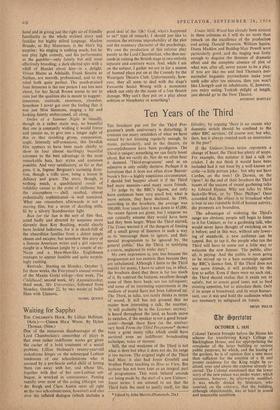Ten Years of the Third
THE brochure put out for the Third Pro- gramme's tenth anniversary is disturbing; it contains too many reminders of what we have missed by not listening regularly enough. In music, particularly, and in the theatre, its accomplishments have been prodigious. The Third is unique; something we can fairly boast about. But we rarely do. Nor do we often hear it damned. 'Third-programme' used as an adjective is only mildly derisive. Perhaps it is fortuitous that it does not often draw Beaver- brook's fire—a highly suspicious circumstance. I should feel happier about it if the Third had more enemies—and many more friends.
To judge by the BBC's figures, not only have audiences been very small but, what is more serious, they have declined. In 1949, according to the brochure, the average was 100,000; four years later it was down to 45,000. No recent figures are given, but I suppose we can cynically assume they would have been had they been larger. When the Third started, The Times warned it of the dangers of fencing off a small group of listeners in such a way as to 'encourage them to ignore, and their special programmes to be ignored by, the general public.' Has the Third, in satisfying a coterie, neglected its wider duty?
My own impression is, yes; less because the programmes are too esoteric than because they are unbalanced. Although I listen to the Third mainly for music, I have to admit (as, in effect, the brochure does) that there is far too much of it. By contrast the features, excellent though some of them have been, are too infrequent; and some of its interesting experiments in the medium of sound have, not been followed up. The Third, in talks, too rarely thinks in terms of sound. It still has not grasped that no matter how interesting a talk, the murmur, 'It will probably be in the Listener, anyway,' is heard throughout the land, as hands move to switches, if the speaker is not a good broad- caster—though there have (as the anniver- sary book From the Third Programme* shows) been a great many talks which could have survived even an indifferent broadcasting technique, voice or manner.
Still, the real weakness of the Third is not what is does but what it does not do. Its range is too narrow. The original night of the Third had Max; it also had Joyce Grenfell and Stephen Potter teaching us How to View. But humour has not been kept as an integral part of programmes. This week belated amends are being made by the start of a new Ustinov/ Jones series; I am amused to see that the Third feels the need to justify itself, for this
• Edited by John Morriso(Nonesuch, 21s.) frivolity, by arguing 'there is no reason why domestic serials should be confined to the other BBC services.' Of course not; but why, then, has it always resisted such an innovation in the past?
If the Ustinov /Jones series represents a change of heart, the Third has plenty of scope. For example, this summer it had a talk on cricket. I do not think it would have been included had it not been by a well-known art critic—a little private joke: but why not have Cardus, on the tests? Or Darwin, on the 'Open? At the end of their brochure the Third boasts of the success of recent gardening talks by Edward Hyams. Why not talks by Miss Sackville-West, or by Theo Phillips? Once conceded that the object is to broadcast what is best in any reputable field of human activity, the prospects are boundless.
The advantages of widening the Third's range are obvious; people will begin to listen to it for Ustinov, or for a gardening talk, who would never have thought of switching on to it before; and in this way, without any lower- ing of standards, a new audience can be tapped. But, to tap it, the people who run the Third will have to come out a little way to welcome the new listener. The public, after all, is paying. And the public is soon going to be stirred up to a hate campaign against the BBC's licence fees. If the Third does not win more friends, it will probably be the first to suffer. Even if there were no such risk, the Third should realise that it exists not to satisfy, but to create good taste; not to feed existing appetites, but to stimulate them. Only if its scope is broadened, and its ways human- ised, can it win and hold the audiences which are necessary to safeguard its future.
BRIAN INGLIS


































 Previous page
Previous page